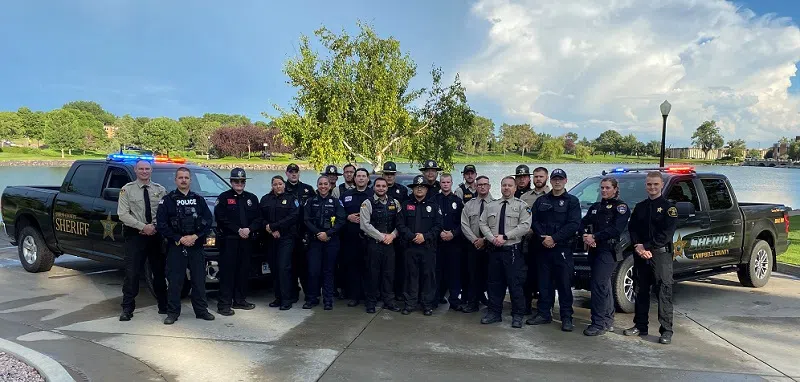SEPTEMBER 4, 2024:
The Cheyenne River Sioux Tribe, the Campbell and Stanley county sheriff’s offices and the Pierre Police Department are among the law enforcement agencies that are employing graduates of South Dakota’s first ever tribal prioritized law enforcement training.
Attorney General Marty Jackley was one of the speakers at this week’s (Sept. 3, 2024) graduation ceremony. He says there were 21 graduates, eight of which are from Tribal reservations.
Typically, potential tribal law enforcement officers had to spend 13 weeks in New Mexico to receive their training, keeping them away from their families and communities. Jackley says this course allowed officers to return to their families and communities on the weekends– something he believes will boost retention and lead to the graduation of more certified officers.
The training began in June and Jackley says officers developed relationships with their classmates throughout, and those relationships will create greater cooperation between jurisdictions in the future.
Jackley says he’d like to offer the specialized training once each year. He says he’s included funding for next year’s class in the budget he will present during South Dakota’s 2025 legislative session. The current class came about through a partnership with the Bureau of Indian Affairs and funding approved by Governor Kristi Noem.
Members of the 192nd Basic Law Enforcement Certification Course and their law enforcement agency are: Anthony Aronov, Martin Police Department; Stephanie Bright, Box Elder Police Department; Forrest Calhoun, Oglala Sioux Tribe Department of Public Safety; Michelle Casiano, Sisseton Wahpeton Agency; Derrek Eagle, Cheyenne River Sioux Tribe; Lance Fillspipe, Oglala Sioux Tribe Department of Public Safety; Dante Gardini, Union County Sheriff’s Office; Tamya Jo Garneaux, Oglala Sioux Tribe Department of Public Safety; Gavin Hoeper Saxton, Pierre Police Department; Samuil Matveev, Campbell County Sheriff’s Office; Mitchel Meyers, Stanley County Sheriff’s Office; Nicholas Myhre, Custer County Sheriff’s Office; Grant Namminga, University of South Dakota; Kohl Oster, Davison County Sheriff’s Office; Ashaun Roach-Valandra, Sisseton Wahpeton Agency; Curtis Shields, Campbell County Sheriff’s Office; Kenneth Stands, Oglala Sioux Tribe Department of Public Safety; Joseph Uses Knife, Cheyenne River Sioux Tribe; Lisa Walterman, Brookings Police Department; Bryan Warner, Spink County Sheriff’s Office, and Akia Winters, Oglala Sioux Tribe Department of Public Safety.
.
AUGUST 29, 2024:
South Dakota Attorney General Marty Jackley announces that 21 officers, including nine tribal law enforcement officers, will graduate from the state’s tribal prioritized law enforcement class course on Tuesday, Sept. 3, 2024.
The 13-week course, which started June 3, included instruction in the law, arrest control tactics, firearms, vehicle handling, and criminal investigations.
“This course helps all of the recruits, no matter what agency they work for, to be strong law enforcement officers and ensure public safety across South Dakota,” said Attorney General Jackley. “Special thanks to Gov. Kristi Noem, U.S. Attorney Alison Ramsdell, the BIA and state and local enforcement for providing support and instructors for the course.”
Graduation begins at 11 a.m. CDT Tuesday at the George S. Mickelson Criminal Justice Center in Pierre. The ceremony will include opening remarks by Gov. Noem and the keynote address by Attorney General Jackley.
Members of the 192nd Basic Law Enforcement Certification Course and their law enforcement agency are: Anthony Aronov, Martin Police Department; Stephanie Bright, Box Elder Police Department; Forrest Calhoun, Oglala Sioux Tribe Department of Public Safety; Michelle Casiano, Sisseton Wahpeton Agency; Derrek Eagle, Cheyenne River Sioux Tribe; Lance Fillspipe, Oglala Sioux Tribe Department of Public Safety; Dante Gardini, Union County Sheriff’s Office; Tamya Jo Garneaux, Oglala Sioux Tribe Department of Public Safety; Gavin Hoeper Saxton, Pierre Police Department; Samuil Matveev, Campbell County Sheriff’s Office; Mitchel Meyers, Stanley County Sheriff’s Office; Nicholas Myhre, Custer County Sheriff’s Office; Grant Namminga, University of South Dakota; Kohl Oster, Davison County Sheriff’s Office; Ashaun Roach-Valandra, Sisseton Wahpeton Agency; Curtis Shields, Campbell County Sheriff’s Office; Kenneth Stands, Oglala Sioux Tribe Department of Public Safety; Joseph Uses Knife, Cheyenne River Sioux Tribe; Lisa Walterman, Brookings Police Department; Bryan Warner, Spink County Sheriff’s Office, and Akia Winters, Oglala Sioux Tribe Department of Public Safety.
APRIL 12, 2024:
South Dakota Governor Kristi Noem and Attorney General Marty Jackley have offered the state’s nine Native American tribes an opportunity to train tribal law enforcement officers.
“People in tribal communities continue to suffer because of the well-documented shortage of tribal law enforcement officers. This hurts all of South Dakota’s nine reservations, so we are taking the lead on training more officers as quickly as possible,” Noem and Jackley wrote. “South Dakota is proud to announce a tribal law enforcement-specific basic certification course this summer – right here in our state.”
You can find the full letter here.
Currently, potential tribal law enforcement officers must spend 13 weeks receiving their law enforcement training in New Mexico, keeping them away from their families for that entire time. Conducting this first-of-its-kind training in South Dakota will allow tribal law enforcement to return home to their families on the weekends, which will boost retention and lead to the graduation of more certified officers.
“We look forward to working with you to accomplish this history-making opportunity and providing desperately needed law enforcement for South Dakota communities.,” concluded Noem and Jackley.
Noem has previously called attention to the challenges that tribal law enforcement faces due to underfunding from the Biden Administration. In February, she urged the U.S. Senate Committee on Indian Affairs to enhance public safety on tribal reservations. And in March, she called for a comprehensive, public, and transparent audit of all federal funds to South Dakota’s nine Native American tribes to help understand the funding level that is necessary to keep these communities safe.








Comments